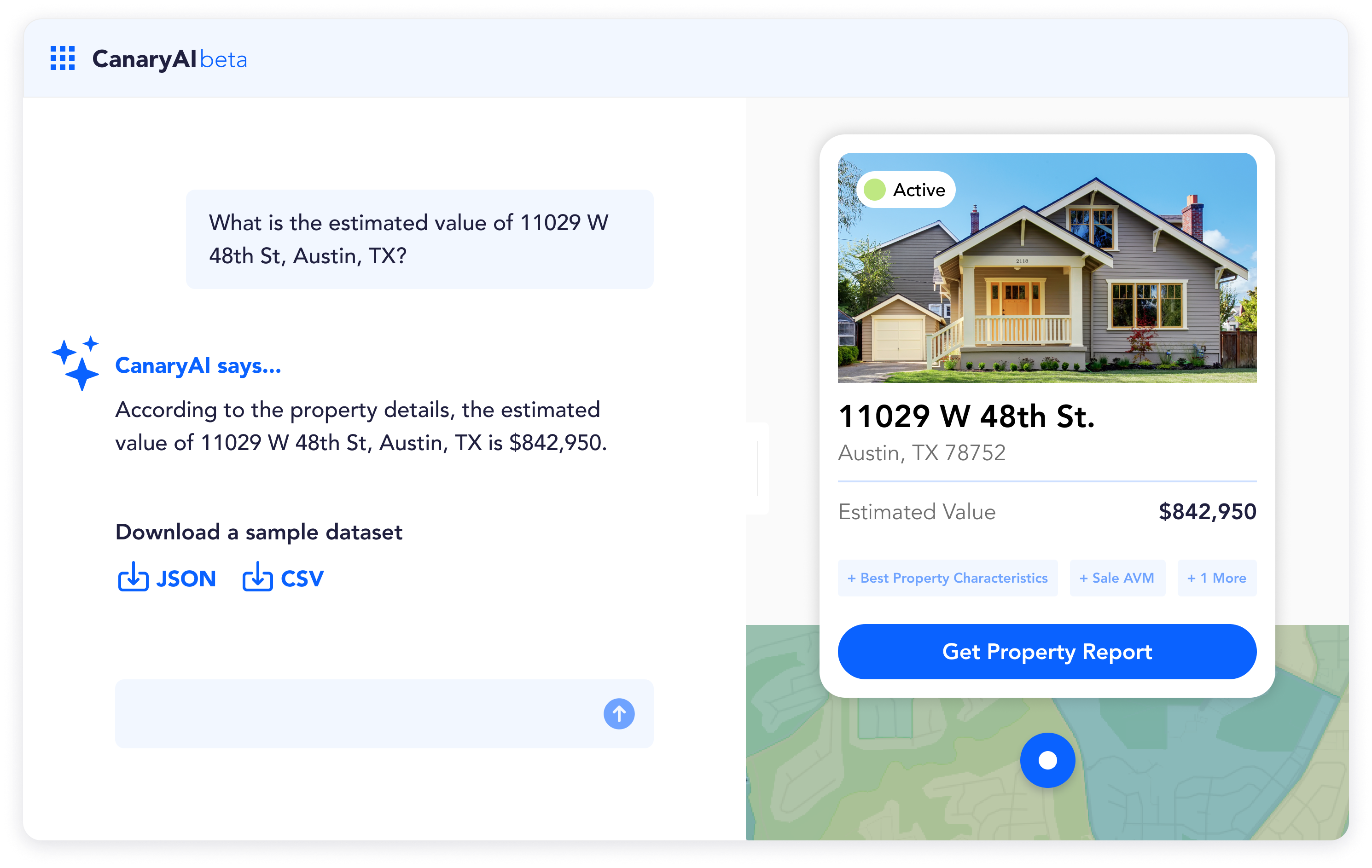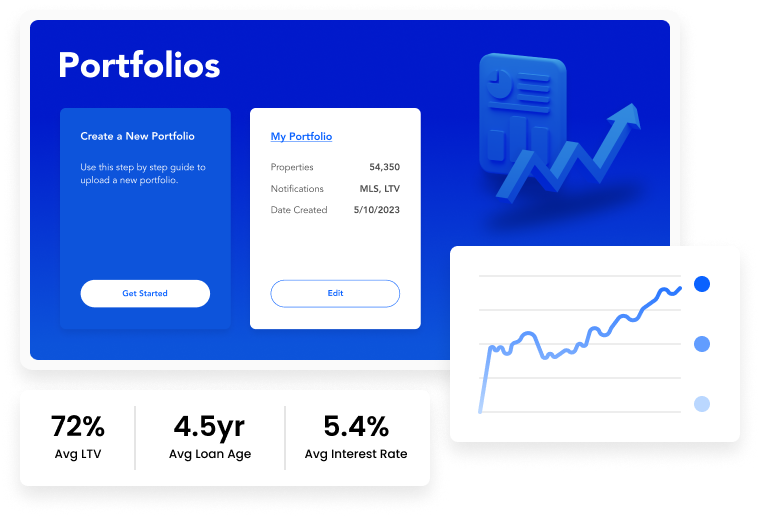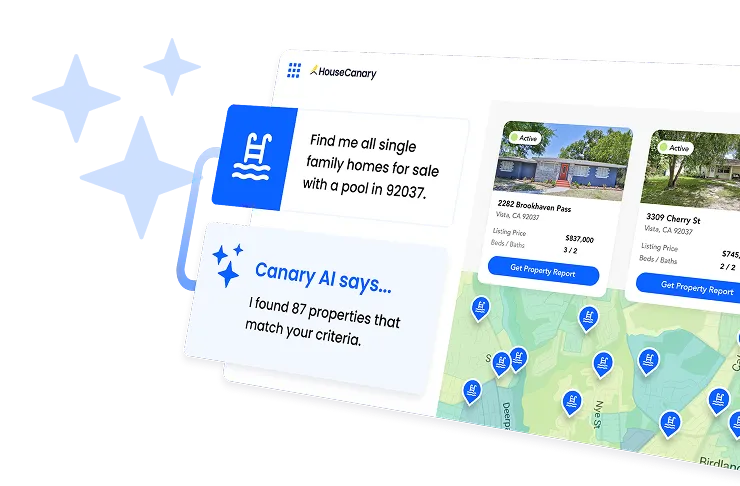
For loan officers and mortgage loan originators, building strong, lasting relationships with clients can lead to significant career and salary growth. In today’s competitive lending market, retaining clients isn’t just about staying connected— it’s about anticipating your clients’ needs and leveraging real estate data to create new financing opportunities within your existing portfolio. By incorporating real-time property records and other data-driven insights, loan officers can proactively engage clients, stay ahead of their needs, and identify untapped business potential.
In this article, we’ll cover how loan officers can use property data to stay connected with clients while identifying new financing opportunities within their portfolios. With tools like HouseCanary’s CanaryAI and Portfolio Monitoring, loan officers can approach retention and client engagement more efficiently, setting themselves up for long-term success.
Why Client Retention Matters for Loan Officers
For loan officers, client retention is a cornerstone of building a stable and growing income. Studies show that retaining a client is significantly more cost-effective than acquiring a new one, and repeat clients are more likely to refer others. Additionally, maintaining client loyalty is a strong driver for salary stability and growth. Mortgage loan originators, too, benefit from repeat clients, as long-term relationships often create a foundation for referrals, increased earnings, and salary growth.
Understanding how real estate data can aid client retention and portfolio expansion is essential for both loan officers and mortgage loan originators.
Key Challenges in Client Retention for Loan Officers
While retention is clearly beneficial, it does come with its own set of challenges:
- Inconsistent access to current property data: Access to real-time property records is essential to tracking client properties and providing relevant, timely advice.
- Reactive communication: Many loan officers only reach out when prompted by the client, potentially missing opportunities for proactive engagement and financial guidance.
- Missed opportunities for new business: A lack of insight into property values or equity shifts can cause loan officers to overlook potential refinancing, home equity loans, or other services that benefit clients.
The Power of Real Estate Data in Client Engagement
Property records and real estate data allow loan officers to stay on top of their client portfolios, anticipate client needs, and make informed recommendations. Here’s how real estate property data enables loan officers to:
- Monitor property values and equity growth: Real estate data helps loan officers track property values, equity trends, and overall market changes, allowing them to reach out to clients when new financing options become available.
- Act on property listing changes: Monitoring property listing status changes is invaluable for loan officers. If a client lists their property, it opens the door for a discussion about financing for their next home or refinancing options.
- Provide market insights that anticipate client needs: Economic shifts and market trends impact property values, which, in turn, affect loan terms and eligibility. By staying on top of these changes, loan officers can proactively engage clients with timely advice.
Client Engagement Strategies Leveraging Real Estate Data
Implementing a few key strategies that leverage real estate data can improve retention rates and reveal new business opportunities within your portfolio:
- Monitor market value and equity changes: Tracking changes in property value and equity allows loan officers to identify clients eligible for refinancing, home equity loans, or other products. For example, if a client’s home value increases significantly, they may be a candidate for a cash-out refinance.
- Utilize property listing alerts: Loan officers who receive real-time alerts when a client lists their property for sale can seize the opportunity to offer advice on financing their next property, refinancing options, or securing the loan for a new home. These timely insights can make a significant difference in retention.
- Provide regular market and neighborhood updates: Sending market reports, neighborhood trends, or insights on local property values can help loan officers maintain regular client engagement. Offering valuable information shows expertise and keeps clients connected to your services.
- Identify underperforming rental assets for investor clients: For clients with rental properties, leveraging property records to identify underperforming assets or trends in the rental market can help loan officers suggest restructuring or refinancing. This valuable service strengthens client relationships and demonstrates proactive support.
- Offer personalized financing options based on data: Providing individualized financing solutions based on property values and equity data reinforces the loan officer’s role as a proactive financial advisor. This approach builds trust and enhances client satisfaction.
Discovering New Business Opportunities Within Your Client Base
In addition to retention, real estate data offers loan officers and mortgage loan originators the chance to find new business within their existing portfolios. Data-driven insights into property value, equity growth, and market conditions help uncover clients who may benefit from additional services, such as refinancing or second mortgages.
Key Strategies to Grow Business Using Real Estate Data
- Track equity trends for additional loan opportunities: Monitoring equity changes can reveal clients interested in home improvements, debt consolidation, or new property purchases, providing loan officers an opportunity to offer suitable financing.
- Identify refinancing opportunities based on market conditions: Fluctuations in interest rates and property values create openings for refinancing. Staying aware of these changes allows loan officers to suggest refinancing options before clients even consider them.
- Consider second mortgage offers for high-value properties: Clients with high-value properties and ample equity may be open to second mortgage offers. Real estate data allows loan officers to identify and present these options at the right time.
HouseCanary Solutions for Loan Officers: CanaryAI and Portfolio Monitoring
HouseCanary provides two key solutions designed to help loan officers leverage real estate data: our gold-standard Automated Valuation Model (AVM) and Portfolio Monitoring. These tools streamline property valuation, track client portfolio changes, and allow loan officers to proactively manage client engagement.
- The Best AVM for accurate property valuations: HouseCanary's AVM offers loan officers precise property valuations by combining MLS listings, public records, and HouseCanary’s proprietary data. With CanaryAI, loan officers can instantly pull AVMs to quickly assess property values, determine eligibility for refinancing or new loans, and provide clients with accurate, up-to-date financial advice.

- Portfolio Monitoring for real-time portfolio management: Portfolio Monitoring allows loan officers to receive real-time alerts on portfolio changes, track property records, and monitor listing status updates. This helps loan officers stay on top of key property and equity metrics, ensuring they can act quickly on new opportunities within their client base.

Conclusion: Strengthening Client Retention with Real Estate Data
In a profession where client retention, mortgage loan originator salary, and overall loan officer salary are closely tied to performance, using real estate data to anticipate client needs is essential. Loan officers who leverage property records, property values, and real-time alerts are better equipped to build lasting client relationships and expand business opportunities within their existing portfolio.
For loan officers and mortgage loan originators, HouseCanary’s CanaryAI and Portfolio Monitoring provide powerful tools to enhance client retention and uncover new business potential. With these data-driven tools, you can offer personalized, proactive support that keeps clients engaged, increases satisfaction, and drives long-term success.
























